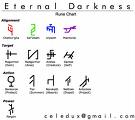I don’t think about theory much these days, focusing more on creative projects. For the last couple of days I’ve been doing some preparation for my classical myth and media class, which sparked a few theoretical thoughts. Also, I’m continuing to think about magic systems, inspired in part by a podcast ( on which Roger Travis graciously invited me to be a guest) about this subject and its relation to Arcana Manor. Magic systems have become the focus of my creative design work and my research, and I tend to think about them through the lens of interactive or procedural allegory, a system of expressive rules.
This will make more sense to readers (hopefully) when the podcast is posted.
A magic system is a set of core mechanics (spell-casting is one of them, maybe the primary one) for simulating supernatural powers and abilities rigorously and symbolically.
Quests, because of their relationship to narrative, tend to be scripted within an engine through quest flags and state changes.
Magic systems can be partially scripted within an engine (depending on the engine’s flexibility), but truly innovative mechanics have to be programmed. New mechanics tend to require, at the very least, modifications to an engine’s source code and may require the development of new engines (or at least sub-systems within an engine).
What matters to me is allegory as system, as organized matrix of rules for generating symbolic meanings. This is distinct from a linear procession of symbols (i.e. narrative) or from free-floating pool of symbols merging into each other (collective unconscious, dream). In linear mediums, allegory manifests itself as narrative (although I wonder if poetry, in its capturing of de-contextualized images, may be allegorical without being solely or even primarily narrative). Rimbaud’s Vowels or Baudelaire’s Correspondences are dense symbols without narratives. Dante’s Divine Comedy does chronicle the adventures of one pilgrim (Dante) through Hell, Purgatory, and Heaven, but the descriptive focus of the poem is the spatial organization of these realms and their inhabitants. The afterlife is a cosmological system for representing the punishment of sin and the rewarding of virtue.
A mythology (whether real as with the Ancient Greeks or invented as in the Cthulhu Mythos) is a system (a pantheon, a set of places, artifacts, recurrent events, themes). Many narratives can occur within a mythos, but many systems can also be generated by a mythology. When I was thinking about quests, I was trying to connect narrative and system, to explore their generative interplay. As I think about magic systems, I am more and more concerned with dynamic, procedural systems, which can be expressive in interactive, procedural, re-configurable ways.
Ritual is a key middle term. Ritual is enacted myth, enacted symbolism.
Eric Zimmerman says that there is magic in games but argues that this magic is the thrill of creativity and problem-solving, which are distinct in his mind from a mage’s 8th-level fireball spell or the mystical experiences of organized religion.
I don’t see these three aspects of magic as inevitably distinct. There are all sorts of connections to be woven between them.
That’s why I have a Clive Barker quotation above my desk, which in condensed form says “magic is the first and last of the world’s religions: a religion whose profoundest ritual is play.” The quotation is longer but would require a detailed gloss to do it justice, because the idea is too important for me to treat lightly. But the main point is that in Barker’s mind the three aspects of magic in games are intertwined expressions of one another. (And he puts his money where his mouth is, since this quotation is from the introduction to his Imajica collectible card game, and he has also discussed the metaphysical implications of the magic system in Undying. Incidentally, the magic system in Undying may be my second favorite magic system, just beneath Eternal Darkness.)
(A sidenote on Jung: Jung coopts the concept of the symbol for psychoanalytic purposes, but the term comes to prominence in Western thought in Romanticism (English, German, French), which precedes Jung chronologically. (e.g. Coleridge, Baudelaire, Rimbaud, Nerval). In the game Eternal Darkness, the narrator invokes Jung, Freud, and Skinner as possible correspondences to the three Ancients, but then dismisses these psychoanalysts as inadequate to the horror and majesty of the beings represented by the runes. This is a nice way of suggesting that, while Jung is a key figure in understanding symbols, their content and operation eludes his unitarian and trans-historical attempts to explain all symbols as products of a psychoanalytic entity (the collective unconscious) which he invented. A theoretical entity which originates in his own German Romanticist/early modernist context and his Freudian training.)
And allegory precedes Jung also (Plato, Spenser, Dante).
I need to read Angus Fletcher’s Allegory: Theory of a Symbolic Mode.
Question for further research: what are some of the most innovative magic systems, both in terms of mode of spell-casting, effects, and symbolism?
Mage: The Ascension and Mage: The Awakening (tabletop)
Magic: The Gathering (cardgame)
Betrayal at Krondor (crpg)
Arx Fatalis (crpg)
Loom (Adventure Game)
Eternal Darkness: Sanity’s Requiem
